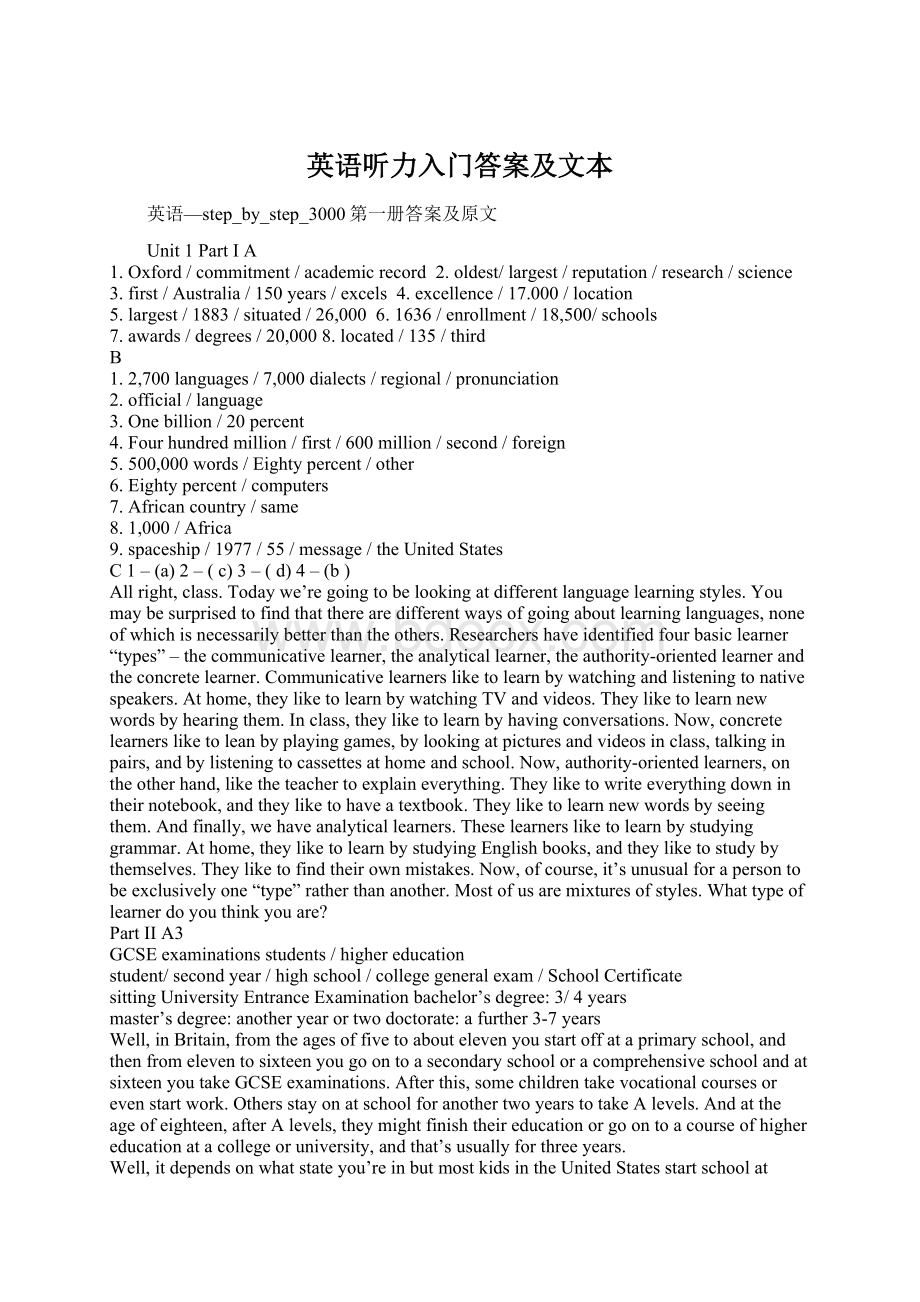 英语听力入门答案及文本Word下载.docx
英语听力入门答案及文本Word下载.docx
- 文档编号:21219346
- 上传时间:2023-01-28
- 格式:DOCX
- 页数:39
- 大小:66.08KB
英语听力入门答案及文本Word下载.docx
《英语听力入门答案及文本Word下载.docx》由会员分享,可在线阅读,更多相关《英语听力入门答案及文本Word下载.docx(39页珍藏版)》请在冰豆网上搜索。

7.awards/degrees/20,0008.located/135/third
B
1.2,700languages/7,000dialects/regional/pronunciation
2.official/language
3.Onebillion/20percent
4.Fourhundredmillion/first/600million/second/foreign
5.500,000words/Eightypercent/other
6.Eightypercent/computers
7.Africancountry/same
8.1,000/Africa
9.spaceship/1977/55/message/theUnitedStates
C1–(a)2–(c)3–(d)4–(b)
Allright,class.Todaywe’regoingtobelookingatdifferentlanguagelearningstyles.Youmaybesurprisedtofindthattherearedifferentwaysofgoingaboutlearninglanguages,noneofwhichisnecessarilybetterthantheothers.Researchershaveidentifiedfourbasiclearner“types”–thecommunicativelearner,theanalyticallearner,theauthority-orientedlearnerandtheconcretelearner.Communicativelearnersliketolearnbywatchingandlisteningtonativespeakers.Athome,theyliketolearnbywatchingTVandvideos.Theyliketolearnnewwordsbyhearingthem.Inclass,theyliketolearnbyhavingconversations.Now,concretelearnersliketoleanbyplayinggames,bylookingatpicturesandvideosinclass,talkinginpairs,andbylisteningtocassettesathomeandschool.Now,authority-orientedlearners,ontheotherhand,liketheteachertoexplaineverything.Theyliketowriteeverythingdownintheirnotebook,andtheyliketohaveatextbook.Theyliketolearnnewwordsbyseeingthem.Andfinally,wehaveanalyticallearners.Theselearnersliketolearnbystudyinggrammar.Athome,theyliketolearnbystudyingEnglishbooks,andtheyliketostudybythemselves.Theyliketofindtheirownmistakes.Now,ofcourse,it’sunusualforapersontobeexclusivelyone“type”ratherthananother.Mostofusaremixturesofstyles.Whattypeoflearnerdoyouthinkyouare?
PartIIA3
GCSEexaminationsstudents/highereducation
student/secondyear/highschool/collegegeneralexam/SchoolCertificate
sittingUniversityEntranceExaminationbachelor’sdegree:
3/4years
master’sdegree:
anotheryearortwodoctorate:
afurther3-7years
Well,inBritain,fromtheagesoffivetoaboutelevenyoustartoffataprimaryschool,andthenfromeleventosixteenyougoontoasecondaryschooloracomprehensiveschoolandatsixteenyoutakeGCSEexaminations.Afterthis,somechildrentakevocationalcoursesorevenstartwork.OthersstayonatschoolforanothertwoyearstotakeAlevels.Andattheageofeighteen,afterAlevels,theymightfinishtheireducationorgoontoacourseofhighereducationatacollegeoruniversity,andthat’susuallyforthreeyears.
Well,itdependsonwhatstateyou’reinbutmostkidsintheUnitedStatesstartschoolataboutsixwhentheygotoelementaryschoolandthatgoesfromthefirstgradeuptothesixthgrade.Somekidsgotoakindergartentheyearbeforethat.Thentheygoontojuniorhighschool,that’sabouteleven,andthat’stheseventh,eighthandninthgrades.Andthentheygoontoseniorhighschoolaroundagefourteenstartinginthetenthgradeandfinishinginthetwelfthgradeusually.Somestudentswillleaveschoolatsixteenandthey’llstartwork,butmostofthemstayontograduatefromhighschoolatageeighteen.Inthefirstyearathighschoolorcollegestudentsarecalled“freshmen”,inthesecondthey’recalled“sophomores”,inthethirdyearwecallthem“juniors”andinthefourthyearthey’recalled“seniors”.Nowalotofhighschoolgraduatesthengotocollegeoruniversityandtheydoafour-yearfirstdegreecourse.Someofthemmightgotojuniorcollegewhichisatwo-yearcourse.
Well,inAustralia,wellmoststatesanyway,childrenstarttheirprimaryeducationatfiveafterperhapsabrieftimeinkindergarten.Theywillstayatprimaryschooluntilthey’reabouteleven,thenthey’lleitherstaythereorgotoanintermediateschoolforacoupleofyears.Thentheystarthighschoolusuallytwelveorthirteen,whichyoustartinthethirdform.Now,afterthreeyearsathighschoolyousitageneralexam,somestatescallitSchoolCertificateandthatisasortofgeneralqualificationandthatifasortofgeneralqualification.AfterthatyoucanleaveschoolatsixteenoryoucangoonandsityourUniversityEntranceExamination,whichthengivesyouentré
eintoauniversityorit’sanotherusefulqualification,andfromthenonyougotovarioussortsofhighereducation.
EducationinCanadaisaprovincialresponsibility,butschoolsareadministeredbylocalschoolboards.
Kindergartenisforchildrenwhoarefourorfiveyearsold.Childrenbeginformalfull-dayschoolinginGrade1,whentheyareaboutsixyearsold.Theymuststayinschoolatleastuntiltheyaresixteen.However,moststudentscontinuetofinishhighschool.Somegotocollegeoruniversity.Eachyearofschoolingrepresentsonegrade.(TheschoolyearextendsfromthebeginningofSeptembertotheendofJune.)ElementaryschoolincludeskindergartentoaboutGrade8.Secondaryschool(orhighschool)maystartinGrade8,9,or10anditusuallycontinuesuntilGrade12.
InCanada,studentsmaygotouniversityortoacommunitycollege.Iftheywanttolearnskillsforspecificjob,theyattendcollegeforoneorfouryearstogetadiplomaorcertificate.Forexample,labtechnicians,child-careworkers,andhotelmanagersgotocollege.Universitiesofferdegreeprogramsaswellastrainingprofessions,suchaslaw,medicine,andteaching.
Universitiesofferthreemainlevelsofdegrees.Studentsearnabachelor’sdegreeafterthreeorfouryearsofstudy.Amaster’sdegreecantakeanotheryearortwo.Adoctoratemaytakeafurtherthreetosevenyearstocomplete.
B1Idioms/vocabulary/French/spelling/pronunciation
B21.F2.T3.F
I–InterviewerP–Professor
I:
AndnowwehaveaninterviewwithProfessorJ.T.Lingo,ProfessorofLinguisticsatChimoUniversity,whoisheretotalktousaboutthegrowingbusinessofteachingEnglish.Goodmorning,professorLingo.
P:
Goodmorning.
IunderstandthatteachingEnglishisbecoming“bigbusiness”allaroundtheworld.
Itseemsthatlanguageschoolsarespringingupeverywhere.
Whyisthat?
Withthemovetowardaglobaleconomy,Englishhasbecomethemostwidelyusedlanguageintheworld.Itisthelanguageofbusiness,aviation,scienceandinternationalaffairsandpeoplefindthattheymustlearnEnglishtocompeteinthosefields.
AnddopeoplefindEnglishaneasylanguagetolearn?
Well,everylanguagehassomethingaboutitthatotherpeoplefinddifficulttolearn.Englishissuchahodgepodgeofdifferentlanguages–it’sessentiallyGermanicbutalotofitsvocabularycomesfromFrench,andtechnicalwordsstemfromLatinandGreek.ThisfeaturemakesEnglishfairlyadaptable–whichisagoodthingforaworldlanguage–butitcausesirregularityinspellingandpronunciation.
Englishspellingbafflesme,too.
Englishalsohasthelargestvocabulary.Oftentherearewordsforthesamething,oneisAnglo-SaxonandonefromtheFrench–like“buy”whichisAnglo-Saxonand“purchase”whichisfromtheFrench.TheFrenchwordoftenhasmoreprestige.
Anglo-Saxon?
That’sthewordforOldEnglish.TheNormanConquestin1066broughttheFrenchlanguagetoBritainandhelpedEnglishevolveintotheEnglishitistoday.
IsthereanythingelseparticularlydifficultaboutEnglish?
Well,theidiomsininformalEnglishposeaproblemforsomestudents.
InformalEnglish?
Aswithanylanguage,therearedifferentvarieties:
slang,colloquial.Formal,written,aswellasthedifferentdialects–British,AmericanandCanadianEnglish.
AndhowisCanadianEnglishdifferentfromAmericanandBritish?
CanadianEnglishisclosertoAmericaninpronunciationandidiom.SomeofourwordsandourspellingsdoreflectBritishusage,however.Wewouldn’tusetheBritishterm“lorry”fortruck,butwehavekeptthe“o-u-r”spellingsinwordssuchas“honour”and“colour”.
Thishasbeenveryinteresting.I’mafraidwe’reoutoftime.Ithasbeenapleasuretalkingtoyou.
PartIIIUniversityLifeA1I.Age/ForeignstudentpopulationII.15hrs(+2or3forlab)/Discussiongroup:
15-20/muchsmaller/informal,friendly/2-3hrs:
1hr
TodayI’dliketogiveyousomeideaabouthowlifeatanAmericanuniversityorcollegemightbedifferentfromthewayitisinyourcountry.Tobesure,thestudentbodyonaU.S.campusisaprettydiversegroupofpeople.Firstofall,youwillfindstudentsofallages.Althoughmoststudentsstartcollegeataroundtheageof18,youwillseestudentsintheir30sand40sandevenoccasionallyintheir60sand70s.StudentsonaU.S.campuscomefromawidevarietyofsocioeconomicbackgrounds.Manystudentsworkatleastpart-time,someofthemworkfull-time.Manystudentsliveindormitoriesoncampus,somehavetheirownapartmentsusuallywithotherstudents,andothersliveathome.Somecollegesanduniversitieshaveaverydiversestudentpopulationwithmanyracialandethnicminorities.Someschoolshaveafairlylargeforeignstudentpopulation.SoyoucanseethatonemeetsallkindsofpeopleonaU.S.collegeoruniversitycampus.Nowthatyouhavesomegeneralideaofdifferencesinthestudentpopulation,I’dliketotalkafewminutesaboutwhatIthinkanaveragestudentisandthendiscusswithyouwhatatypicalclassmightbelike.
Le
- 配套讲稿:
如PPT文件的首页显示word图标,表示该PPT已包含配套word讲稿。双击word图标可打开word文档。
- 特殊限制:
部分文档作品中含有的国旗、国徽等图片,仅作为作品整体效果示例展示,禁止商用。设计者仅对作品中独创性部分享有著作权。
- 关 键 词:
- 英语听力 入门 答案 文本
 冰豆网所有资源均是用户自行上传分享,仅供网友学习交流,未经上传用户书面授权,请勿作他用。
冰豆网所有资源均是用户自行上传分享,仅供网友学习交流,未经上传用户书面授权,请勿作他用。


 对中国城市家庭的教育投资行为的理论和实证研究.docx
对中国城市家庭的教育投资行为的理论和实证研究.docx
